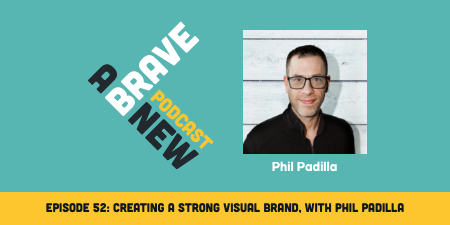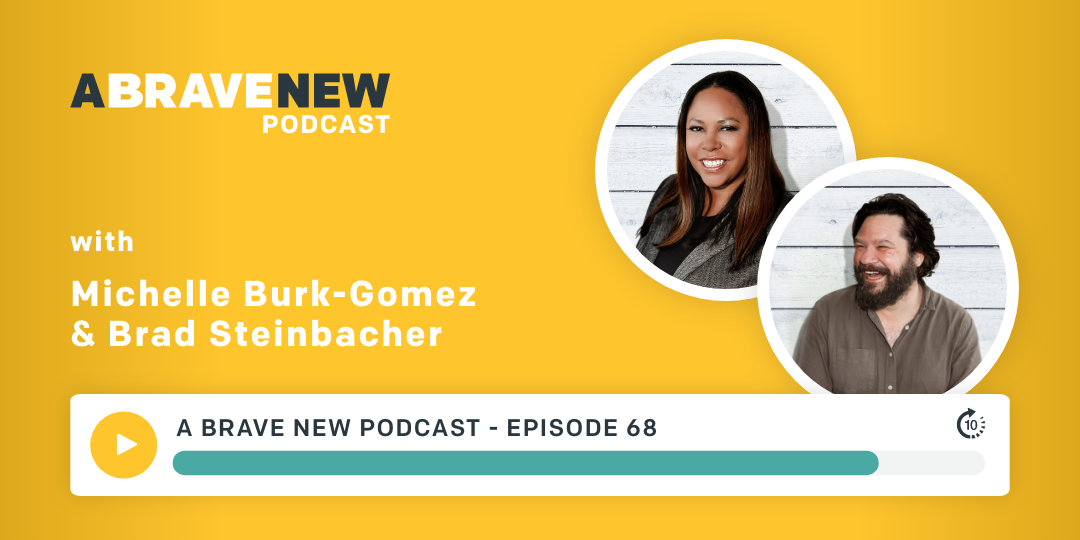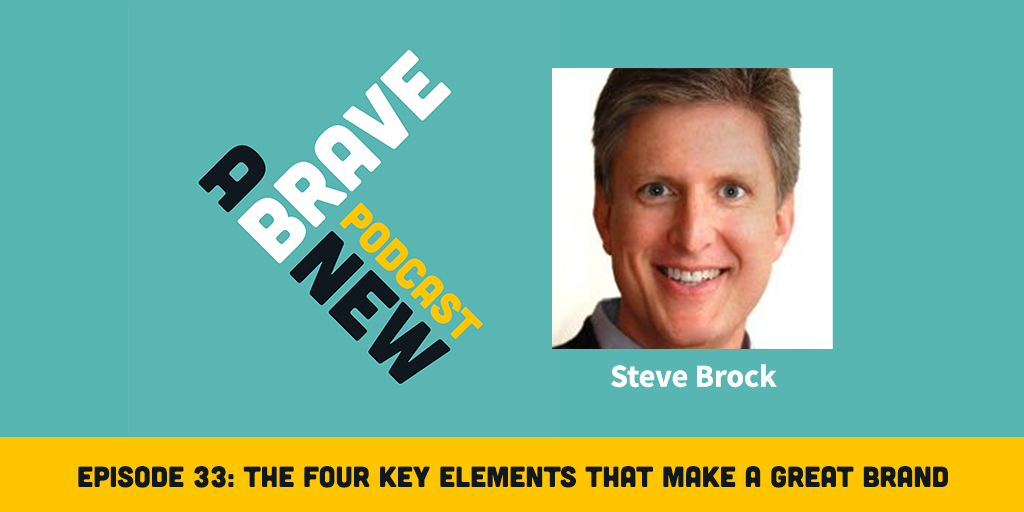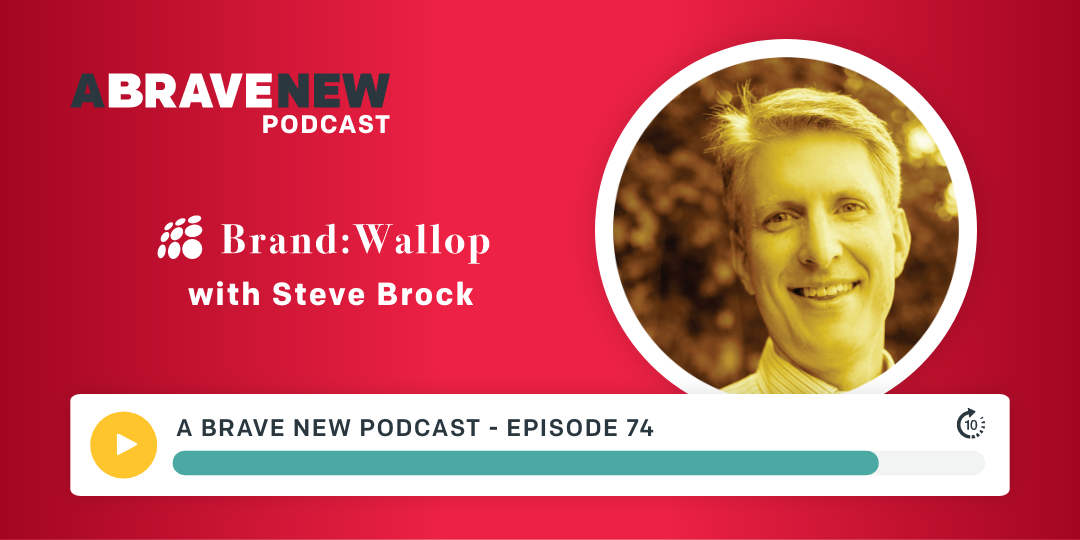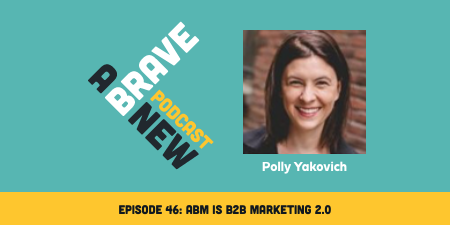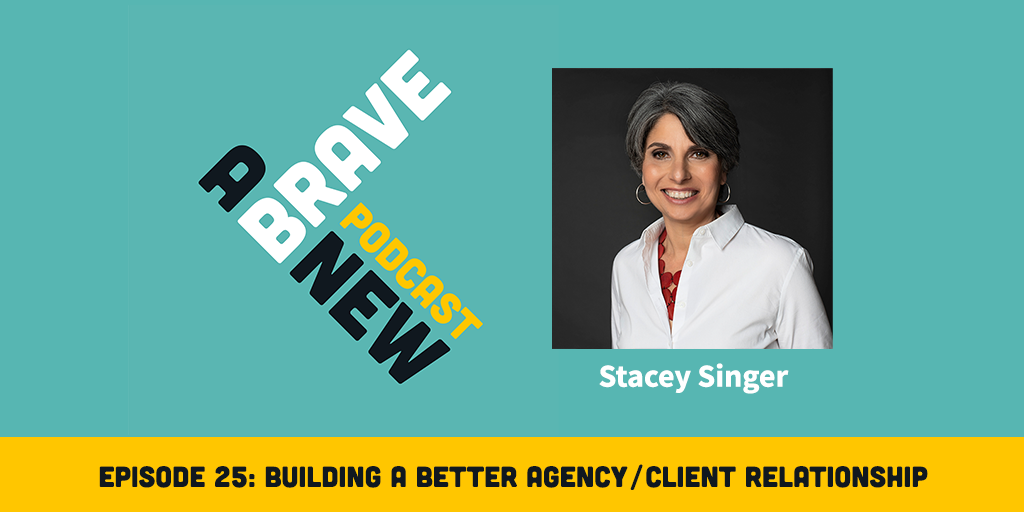Before he entered the world of marketing, A Brave New’s Content Director Brad Steinbacher spent 14 years as a journalist and editor at Seattle’s leading alternative newspaper The Stranger. His marketing work has included creating content for Fortune 500 companies, political campaigns, and penning opinion pieces for former members of Congress and professional sports stars. At A Brave New, Brad guides and oversees all content for clients, ensuring brand guidelines and voices are followed, and generating new ideas for content delivery. In his free time, Brad enjoys sports, playing video games, and pretending that he’s not actually middle-aged.
What you’ll learn about in this episode:
- Brad’s journey from journalist to seasoned content professional
- The lessons that Brad learned in the newsroom that have helped he and his team create better content for client
- Ways to keep your content fresh when it feels like you’ve exhausted every single approach to your content
- How to find inspiration (especially by reading nonfiction and unplugging from technology)
- How brands can level up their content game
- The important things companies need to think about as they use content to build brand differentiation
Additional resources:
Transcription:
Intro: Welcome to A Brave New Podcast, the podcast all about how big ideas, brave thinking, and marketing smarts help businesses grow. Here is your host, Josh Dougherty.
Josh: Hello, and welcome back to A Brave New Podcast. This is your host, Josh Dougherty, and I'd like to welcome you to lucky number 60, Episode 60 of the podcast. And today I have a special guest joining me from the Brave New Team. I have Brad Steinbacher, our Content Director. Hey Brad, good to have you on.
Brad: Thanks for having me, I'm excited.
Josh: Nice. Well, I'm really excited to have Brad on to talk about content, talk about what he's done throughout his career, and really dive into some concepts around creativity and a number of other things. But without further ado, Brad, I'd love to have you just share a little bit about your story, your career path, where it's taken you, as you introduce yourself to our listeners.
Brad: Sure. I grew up in Seattle and when I was in high school, I had a job at an art house movie theater chain. And one day somebody came there and started working, who had moved to Seattle to help start this alternative weekly newspaper called The Stranger. It was like a version of The Village Voice or The Seattle Weekly, at the time. And through them, I started getting some small writing gigs with them, so I was published officially when I was still a senior in high school. Which was pretty great and made my English teacher, Mr. Doyle, very proud of me.
After high school, I joined the staff of The Stranger, at first as a receptionist, did a ton of different jobs there, from delivering papers, to doing their marketing, to being the assistant to the publisher. And then eventually, for the last 10 years or so there, I was in editorial. Most of it as managing editor, working hand-in-hand with an editor, Dan Savage, the famed sex advice columnist, who got his start with The Stranger and had been named editor in like, 2000. We worked closely for a good decade until I left the paper.
Josh: Yeah. Epic stories, I'm sure, there. And then you've been in the agency space since then, really, right? Working, doing content for people?
Brad: Yeah, in 2008, I had a kid on the way and alternative weekly newspapers don't pay really anything at all. And I got offered a job through a friend at this boutique marketing agency. They focused on public affairs advertising, along with some local campaigns. We ran the campaign for the first run for Seattle mayor, Mayor McGinn, Mike McGinn. And he won that one, he didn't win the second one that we didn't work on, so, I'm a little proud of that.
Josh: There's clearly a connection there, right? If he had hired you for number two, it's in the bag.
Brad: It's clear as day. Really, yeah. But our main client at this agency was AT&T and one of the lessons that I learned from that experience was A), I didn't like working for AT&T and B), when you are beholden to one large corporation and they decide to not work with you anymore, the agency is in trouble. And in our case, it folded because they just didn't have the revenue coming in. Some of us went and started another agency in the same space. I left that in 2017, took some time off and then I landed into A Brave New and it's been great ever since.
Josh: Funny fact, when Brad started at A Brave New, when he was interviewing, he thought I was German, the first day he came into his interview.
Brad: I have this tin ear where I cannot understand accents and then I just assume people are from the wrong places.
Josh: I put off a strong German vibe, so I don't know.
Brad: You do. You're very orderly.
Josh: Exactly. I'd love to hear about some lessons that you've learned in the newsroom, running an editorial team for a number of years, that have helped translate into the marketing space and have helped you succeed in what you're doing now.
Brad: Yeah. The interesting thing about The Stranger at that time was, there were very few actual journalists on staff. We hired creative people, a lot of them were theater majors, we taught them how to write. And what I really liked about that was you were leaning into the weirdness of everybody, the creativity of everybody, and everybody has their own creativity. And so being able to tap into that and let them be free was a big lesson for me.
Another one was to be authentic, even if you are wrong. If you are authentic and you're open in the journalism space and open to new ideas or people to have different opinions, it's very successful. And in marketing, being authentic, I think, is really important, because people smell authenticity like a wet T-shirt. They just know, even if it's just a tweet, they'll just know if the company is full of crap. You have to make sure that you're being open, as clear as you can be, and authentic with what you're doing, in all writing.
Josh: Yeah. I won't delve too far into this, but I know also, because The Stranger has a high entertainment factor from hearing your stories over the years. What are a couple things that you guys were able to do at The Stranger that you wouldn't be able to pull off at a marketing agency? What are some of the good memories from working there?
Brad: Yeah. Well, there's a lot of stuff that we did in the late nineties, early two thousands, at The Stranger that we couldn't do today. The big thing was, we weren't dis-contrarian. We just wanted to do, a lot of the time, stuff that just made us laugh internally. And that's not to say there wasn't real journalism there. We had news sections that were very solid and a lot of the time, we were breaking local news stories before the big papers. But, for us it was just, if we make ourselves laugh, we can make others laugh. Sometimes we crossed a line. There was one issue we did where it was modern Halloween costumes. And one of the costumes was a kid dressed up as somebody being tortured in Abu Ghraib, with the famous black cap and everything. Probably couldn't get away with that today, but at the time when we were satirizing the Bush administration, it got a lot of attention and surprisingly, most of it was positive. People got the joke. We just took a lot of risks, and sometimes we ended up hitting ourselves in the face. But, a lot of times...
Josh: I feel like that's actually good advice. Maybe we wouldn't go that far, but I like the concept of just trying shit and seeing what happens, and then learning from it.
Brad: Yeah. I mean, you definitely don't want to do stuff like that in marketing, but you can be daring. And even if it doesn't see the light of day, it really just pushes you forward to throw something out there that is just like, whoa, no, no. At my first agency, AT&T would ask for a hit piece on a competitor or something like that. And they'd say, we want something really daring. We called it, ‘showing them the gun.’ We were like, here's your gun. And every time they would be like, whoa, whoa, whoa, that's way too much, but we would like to focus on this sort of thing. And so if you're able to really put yourself out there and take risks, chances are when you pull back, you're going to land on something creative and good.
Josh: Yeah. Nice. Something we talk about a lot about a brand, and maybe this can roll over into the brand, because I do think we want brands to be more daring so they are more memorable, typically. But we talk about how we're trying to create a specific memory in a company or in a customer's mind, so that the brand can become memorable, be remembered past that next meeting they have, be remembered in a couple years. But what role do you think content plays in helping create that memory? How are you as a copywriter? Are you with a copywriting team thinking about, let's create some memorable content? Let's use this to create some memorable experiences?
Brad: Yeah, it's really important for brands to have a voice and for that voice to reflect them and what their values are. But also to, like we talked about earlier, be authentic. And you don't want to come across as condescending, but you do want to make it seem like people can come to the brand because they know what they're talking about, and they'll explain it to you in a way that you can easily understand. I mean, I think those are really big keys to creating a memorable brand that people will remember after the next meeting, as you said.
Josh: Yeah, totally. And I always think if you're not making a statement with that voice or you're not making a compelling stand on something, everyone's just going to be, meh, about you. I think with many brands, if we're doing it right, people are going to hate you, or they're going to love you. And we're trying to make sure that there are just enough people that love the brand because you're going to make enough of a statement. As we think about creating that kind of memorable brand or creating a memorable campaign or whatever, I'm interested about learning where you get your ideas, where you gather inspiration, how you refill that tank of getting that inspiration to make sure you're bringing fresh ideas all the time to the work you're doing.
Brad: Yeah, I think a big part of it is to step away from, in our case, the B2B space and really look at what, not just consumer brands are doing. My kids are obsessed with YouTube, and a lot of it is just them watching people talking about products they've bought or are reacting to on videos. And there's something about that that I find interesting, in that it's a direct promotion of something that doesn't feel like it's direct. And that even though these brands are probably paying these YouTubers money, the way they're coming across, I feel is very authentic and at least seems honest. I know they run into some problems where they aren't reporting that it's paid content or stuff like that. But when you get those reactions from actual fans of, I don't know, whatever the children ... Slime or whatever it is nowadays, that there's something about it that I find that you can apply to actual content without copying them directly.
Josh: Yep, I find that too. Getting my mind completely out of anything related to my job is the key to, even if it's like fucking, I don't know, yesterday I was doing a construction project at my house. And even that helps with creativity, right? Because you're just reengaging in a different way into how you're looking at the world, right? Shifting your perspective slightly.
Brad: Yeah, absolutely. And in a state like Washington, there are other ways that I relax and come together with my creativity. Generally, it's just exploring what else is out there, what the kids are doing, because I'm old. And also, just reading as much as I can that is not related to marketing at all [inaudible 00:12:52] was a big, big help. Director Stanley Kubrick once talked, somebody asked him, what's the best film school? And he said, living your life. It's not what people tell you, it's just get out there and live your life and you'll find your voice. I think stepping away from marketing talk is a great way to just come back swinging with good new ideas.
Josh: Yeah, I think that's a good segue into the next thing I was going to ask about, which was for some content creator that feels like they're creating repetitive content over and over again, because they're just going over features, maybe of the product they're selling, that sort of thing. One way to stay fresh, right, is to live your life and actually close your computer and go look out at the rest of the world and think, okay, how do I bring that back in? But what are other tips you have for keeping that content fresh over time?
Brad: One thing that I run into and I often struggle with is, when you write enough for one client and you're often writing about the same thing over again. The content inevitably ends up sounding like you. And so trying to keep it fresh man, okay, this sounds like I was telling somebody this story. What if it was somebody else telling this story? What if I didn't fall into certain tricks that I subconsciously use that I know is going to work to make the flow of an article, stuff like that? What if I had tried to start with the end and then work my way? You have to break yourself out of your comfort zone in order to try to get it, to keep it fresh, especially when you're writing about the same topic over and over again.
Josh: I guess this is expanding that to a little bit more broadly, but I think something you and I have been talking about a lot lately is, how do we expand even to how we're telling stories or expand the way we're telling stories about our clients? Because they get so focused in on features or services or the direct, here's why we're better than everyone else, and thinking more about how do we get to the end product or the end benefit? Or how do we tell a story that's going to allow someone to see themselves in that story versus just explaining what the client does? What other thoughts or maybe ideas do you have that are more crazy along that line, around getting out of your standard, here's five reasons to evaluate this product, or here's this product versus that product?
Brad: I think one of the keys that you mentioned is that it's a story at the end of the day, you are telling a story with your content. Nobody wants to sit in a college lecture. They want to have a story that they can follow, with its ups and downs, it's right turns where, oh, I didn't expect that coming. And that's hard to do in the B2B marketing space, but if you look at it like a story, it's not just a written word that you have in front of you. You do it with images, you can do it with innovation ... You can do a TikTok video if you find yourself in a space that TikTok viewers are going to actually want to see.
But there are all these different outlets we have now where you can do something potentially unexpected to tell your story. Use different mediums to tell your story that ... Sometimes it's as simple as an infographic. Sometimes it's a video that has actors in it, but finding the right way to tell the story and then telling a story in that medium is, I think, just something you really need to always be focusing on and just trying out, throwing stuff at the wall.
Josh: Yeah, for sure. What do you think ... So this is related to that because stories exist for the people who are actually reading them, right? We are trying to always connect in and talk to the people that, in our work, who are going to potentially buy the products that our clients are selling or the services. What do you think is the hardest part about creating content that really connects with that audience? I have an answer too, but I'll let you share yours first because I'm interested to see if we think the same or we look at it slightly differently.
Brad: Yeah, it always starts with the pain points of the audience. And what I found, is a lot of times the pain points are exactly the same, regardless of the client. They're not getting as much out of their investment in something, their teams aren't as efficient, they aren't able to cut through the noise. And so coming up with ways to make those pain points compelling, in that we feel your pain, and here's how we can help you get across that threshold of pain, I think is really important. But I also think that, one thing that I've been trying to focus on more is, we don't just feel your pain, we understand why you're feeling that pain. It's not just, oh, you have this problem, here's how we fix it. It's like, you have this problem, and we think it's because of this. And I think that gets them on a more personal level, gets them drawn in a bit more to be like, okay, they're listening to me even though I wasn't saying anything to them. They get where I'm at, I think it is really a good thing to strive for.
Josh: Yeah, mine is related. I think it's the same thing. I think the hardest part is really understanding what that, well, understanding how you express that I get your situation? Because I agree, the pain points are often similar, but that doesn't mean their situation is at all similar to the next person. And I think the other hard part is getting people to trust that you're not selling a product, you're selling a solution, an emotional solution to an emotional problem that someone has, most of the time, right? They're not just trying to ... There's a lot of emotion tied up even into a B2B purchase that people are like, there can't be any emotion here. And it's like, nope, the person's still buying based on the pain they're feeling, or the stress they're feeling, or the aspirations that they have, whatever it is. I was thinking about the ... Go ahead.
Brad: Well, I was just saying, I think that feeling bleeds into how you actually structure your content. And that there's a saying, I don't know where I heard it, it might have been from Tom Cruise, that it doesn't matter how long a movie is, it matters how long it feels. And I think that goes into when you're constructing your content, sometimes something will take 4,000 words to really get that emotion across. But sometimes you can do it in just 200 words, so don't limit yourself to certain structures or anything. It's all about creating an emotion or feeling with the person who's reading them.
Josh: Yeah. I don't know if I've ever had a Tom Cruise reference on this podcast, so I'm very happy about that.
Brad: Tom Cruise and Stanley Kubrick [inaudible 00:20:40].
Josh: And Stanley Kubrick, yes. I think Stanley Kubrick was probably taller than Tom Cruise, also.
Brad: I've met Tom cruise in person and he is tiny. I can attest to that.
Josh: I was just thinking, so to mention another person. I'm reading, This is Marketing by Seth Godin right now, or Godin, I can never know how to pronounce his name. I should probably learn that since he's famous. But he talks about the key question that marketers or the thing that marketers are answering is, do your customers love themselves more because they love you? And I think it gets that core idea of, is it making their life actually better the way that they're interacting with you? This feels kind of really soft and fuzzy, but I was like, that's kind of nice. It really makes me break out of how I think about creating great content.
Brad: Yeah, I mean the obvious example for that is Apple. People, for better or worse, often feel their worth on what they do with Apple.
Josh: Totally.
Brad: And they have a way of not just tapping into, hey, you need this product because of this. It's like, you want this product because here's all the things you can do with it, is how it's phrased. And you don't have to worry about their classic tagline of, it just works. Yeah, that's so simple, but it says so much. They're like, we know you're frustrated with technology, here's something that you won't be frustrated with.
Josh: Yep. I think about it too, I'm a big soccer fan, as many people on this podcast know. And part of my experience is that I love the Sounders here in Seattle because they do make my life richer every time I interact with them, right? Maybe not as rich on Saturday or this year when they kind of suck, but it still adds meaning, so it creates a wealth in my life, being able to have them. I think that's what great brands do. It's harder with a B2B brand, but we've got to figure out ways to break through because people aren't sitting around being like, that's a B2C brand, so I expect something different. That's a B2B brand. We look at these artificial lines I think we create and then think, oh, it's not as much of an expectation because we're selling to companies, but that's not really true.
Brad: Yeah, coming from public affairs, to advertising, to B2B advertising, at the end of the day it's all very much the same. There's not a big difference between writing a print ad that runs in The Hill to writing a blog post. You're still telling a story. You're still breaking down information that people can digest and you're still making an argument without being overt about it.
Josh: Yeah, you're just using more or less words depending on the format you're working in, right?
Brad: Exactly.
Josh: What suggestions do you have for brands that are looking to level up their content game? What are the areas that you would look at if you're coming into a new company and they're like, we're sick and tired of what we're doing? Where should we start?
Brad: Well, one area that I would definitely look at is, look at your brand as it currently is. I mean, if you've been around for a while, this is your brand ... Every company evolves in what they do and your brand needs to evolve along with it. Oftentimes people, companies will think, oh, we have a different logo, therefore we can do a lot more different with our brands. Well, your tone of voice in your brand needs to change along with you, as you grow, and have more success, and your voice needs to change with that. I would think, make sure to regularly go back to your brand and examine it and really tear it apart and try to challenge it in areas, especially with voice.
And also I would say, everybody has some little spark of creativity. And so if you can widen, you can pick the brains of your greater team at large, not just the people that are in marketing or really focused on your brand all the time. I think you can come up with some new ways to market yourself out there and get your brand out there, not just in different mediums, but in the types of ways that you create content. Sometimes a simple FAQ is the most powerful thing that you can do because it hits everybody's questions and delivers an answer they need in a really compact way. And don't be afraid to just go for what you think is boring, just as much as you shouldn't be afraid to really take a swing and do something really weird. It's like salt. You can always add more salt and you can't take it away.
Josh: Totally.
Brad: You can always go way out of bounds and then pull it back in. Well, actually, it's the opposite of salt. So [inaudible 00:25:59]
Josh: I was going to say, that's not much like salt.
Brad: It's the opposite of salt. That's the title of my marketing book, The Opposite of Salt.
Josh: Exactly. I think that would be a good book. You should probably write a book called The Opposite of Salt. The Unsalt. As we wrap up here, I'm interested to hear, you've worked with a lot of young writers, you've helped mentor them, help them get better at what they're doing. What are some hacks or tips you have for people as they're getting started as a content creator today? What would you recommend they invest in or think about?
Brad: Yeah, one thing that I always say to everybody is that writing is a muscle and you have to work it out, otherwise you're just going to atrophy and you're not going to get what you want out of it. Just write as much as you can, even if it's not work related. Just sit down one day and say, I want to see if I can write a screenplay. And even if you don't get very far, at least you're working that muscle out. Read a wide range of things, weird books or magazines or online blogs and stuff like that and don't be afraid to steal, don't plagiarize, but you'll learn tips that writers do that you like. And whether it [inaudible 00:27:30] the flow or how they use em dashes, which I'm a big fan of. The more that you can absorb, the more you're going to be able to apply that to your own writing as you grow. Those are the big ones, I would say, yeah.
Josh: Yeah, I really agree with the reading broadly. I think there's a lot of people that are like, I read just business books and I'm like, that's going to make you a horrible writer because you need to look at fiction, non-fiction, across all these genres, magazines. I think some magazine writers are the most brilliant writers out there.
Brad: Oh absolutely. From a persona l... I was writing in high school, but when my writing really took a jump was when I committed to reading the New Yorker, cover to cover every week when I was in my early twenties. And it really helped a lot because you're reading all these different voices, all these topics you would never normally be interested in. And that's where you learn what great writing is.
Josh: Yeah, because they have enough space in a magazine like that to put together a detailed article with, and they still have to be concise, you really get the personality. I think that's one of my favorite things. I'm an old man and when it comes to magazines, I have certain writers at certain magazines and I'm like, I'm going to read absolutely everything that you are going to write. Maybe we all do.
Brad: And I also feel that nonfiction books are a really great way to learn the art of how to distill a complicated thing into something that people can get.
Josh: Totally.
Brad: There's a great book, I can't remember it by his name, it's called Nixonland. And it's about how Richard Nixon ...
Josh: That book is great.
Brad: Yeah, it created basically Fox News and we're in the Republican mess we are today and he's very good at really tapping into, breaking down, well, here's what this spark that created this, that created this. Books like that are very valuable.
Josh: Yep.
Brad: To help you create content.
Josh: And before you know it, he's written 800 pages and you've read through 800 pages of this guy's complex story. It's kind of crazy.
Brad: Yeah, there are two Reagan books out now I haven't been able to read yet. I'm like, ah, so many words. Rick Perlstein, that's who it is.
Josh: Yeah, there you go. We'll put a link to him in the show notes so you can check out that book. It is epic.
Brad: Yeah, it's really great.
Josh: This brings me another ... you've mentioned em dashes, where do you fall on the Oxford comma? This is the age old writer's dilemma. Are you pro or anti?
Brad: I am pro the Oxford comma.
Josh: Good. You can stay employed now.
Brad: I am of the belief that I'll die for the Oxford comma, but the Chicago Manual Style, AP, those things are important for a writer to understand, especially in marketing. But at the end of the day, you want your content to sound conversational, that's how I feel about it. I had a young writer ask me one time my feelings on commas, and I said, well, I use commas whenever natural space in somebody telling you something would land.
Josh: Totally.
Brad: That's my only guide for it, except for the Oxford comma, which obviously should be there all the time.
Josh: It should be there all the time. Amazing. To finish out, I ask everyone what their superpower is. So, Brad Steinbacher, what is your superpower?
Brad: Well, first of all, I'm hilarious, so that is something that I find to be a good superpower. And also that really what every writer who does this for a living, their superpower that I share with them, is being able to just stare at a blank page and start writing. That is the entire superpower of writers, really just being able to get over that hump, repeatedly every single day.
Josh: And to create good shit on a deadline. I think that is a superpower too.
Brad: Yeah. Deadlines are great, at least from journalism, in that it keeps you on task. But at the same time, the problem with a deadline is, I will often be like, I need that pressure of I'm running out of time to really start writing. And so it's a dance you have to do.
Josh: Yeah, I don't know if I am thankful for that because I started my career as a copywriter at agencies too. And so I don't know if it's a blessing or a curse that now I can't do anything without a deadline. I have to feel the rush of the pressure before stuff starts coming out, so.
Brad: I don't know, it's sad, I'll look out and I'll be like, all right, I need to set a deadline to mow the lawn by Sunday.
Josh: Exactly.
Brad: And then Sunday morning will come and I'll be out there scrambling to do it.
Josh: Exactly.
Brad: Just how my brain works.
Josh: Yep. I don't know, does the chicken or the egg come first? Who knows? We won't be able to answer that here, so.
Brad: Very true.
Josh: Thanks so much for joining us today, Brad. Where can people find you online if they want to connect with you?
Brad: Probably my Twitter handle, @BradleyStein, which is all one word. Funny enough, there is an actual person named Bradley Stein in Washington, DC. He's been trying to get my Twitter handle from me for years now, but.
Josh: Cool. Well, thanks so much for coming on today, and I'm sure we'll have more chances to talk in the future. Really appreciate it.
Brad: Yeah, thank you. This was fun.
Outro: Thanks for listening to this episode of A Brave New Podcast. Go to abravenew.com for more resources and advice. If you enjoyed this episode, show us some love by subscribing, rating, and reviewing A Brave New Podcast wherever you listen to your podcasts.
Similar Articles
OCT 11, 2021

The Beginner’s Guide to Generating Inbound Leads
Marketing doesn’t have to be painfully intrusive, like getting yet another telemarketing call right when you sit down to dinner with your family.
OCT 11, 2021

The Beginner’s Guide to Generating Inbound Leads
Marketing doesn’t have to be painfully intrusive, like getting yet another telemarketing call right when you sit down to dinner with your family.


